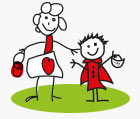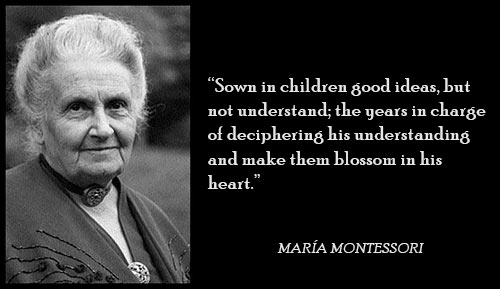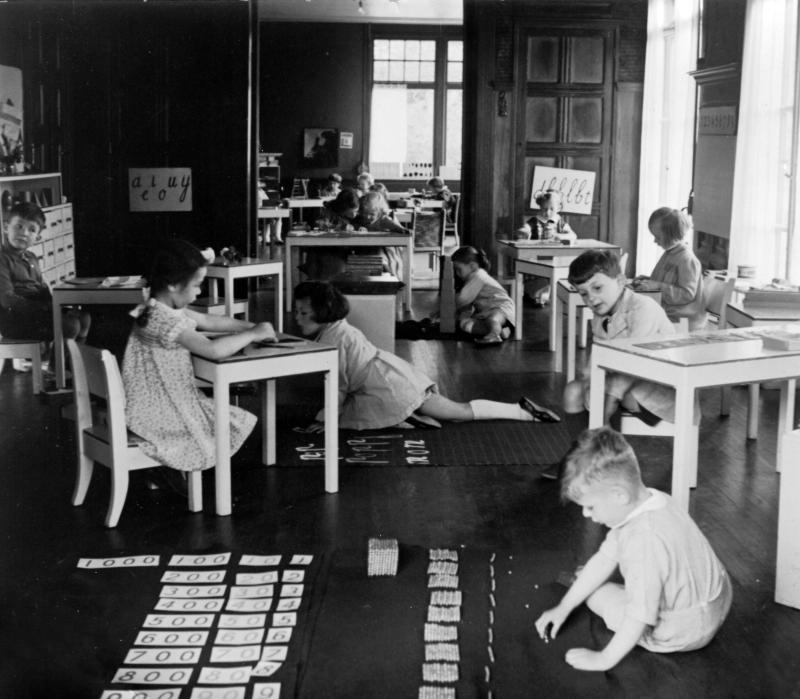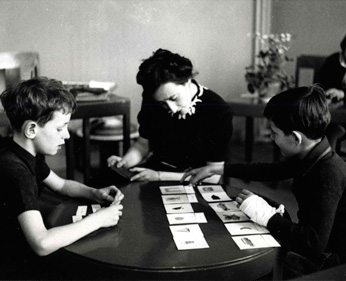

Nursery education project Txanogorritxu / Little Red Riding Hood Children School
To the Italian doctor and teacher Maria Montessori, the goal of education is that children acquire the maximum physical and mental independence, and learn to think for themselves.
Dr. Montessori educational method he based on providing children an environment and materials that would serve them to advance knowledge for themselves, leaving the teacher the role of counselor. She believed that early stages in the development of a child are crucial, and must be given the freedom to choose smaller from the available options; in other words, allow children to satisfy their natural curiosity and discover the world through their own experiences, without receiving information from others.

Nursery Txanogorritxu educate children with the Montessori method from birth to the incorporation of children to preschool
Its purpose is educational autonomy in all senses to form a critical intellectual, moral thinker through reciprocity and mutual, social respect by working with peers, emotional security that provide the boundaries, the education of the will and self-sufficiency.
The adult is an observer and guide; support and encourage the child in all their efforts. It allows it to act, want and think for himself, helping him develop confidence and inner discipline.
- Parents are involved to include own basic health and hygiene as a requirement for school
- The teacher should be trained in the method and will act as an observer and advisor
Montessori education covers all educational periods from birth to 18 years of providing an integrated curriculum.
The Montessori environment
The Montessori environment is provided to the extent of children with low shelves and various measures of tables and chairs where children feel individually or in groups. The classroom is divided into thematic areas corresponding materials and literature are presented and allows great freedom of movement.
Teaching materials (scientific) self-corrective, are used as the material goes through experimenting by himself and will correct their mistakes
The prepared environment provides children with opportunities to engage in interesting work, freely chosen, which encourages extended periods of concentration that should not be interrupted.

Freedom is developed within clear limits that allows children to live in the small society of the classroom. That freedom and self-discipline make it possible for every child to find activities that respond to their evolving needs. The Montessori classroom brings together children from three different age groups: children under 3 years (provided in our nursery schools) of 3-6 years from 6-9 years to 9-13 years.
Integrated halls encourage spontaneous cooperation, the desire to learn, mutual respect and deep incorporation of knowledge through exercise to teach others.
The kid
Every educator must "follow the child"
Child development arises from the need to adapt to its environment: the child needs to make sense of the world around him and builds himself in relation to that world.
Maria Montessori observed that the child grows from childhood to adult period through four evolutionary periods called "development plans". Each period has radically different from the other features, but is the foundation of the successive period.
- 1º - Birth to 6 years:
It is characterized by the absorbent mind of the child, which takes and absorbs all aspects, good and bad, the surrounding environment, language and culture. - 2º - From 6 to 12 years:
The child has a rational mind to explore the world with their imagination and abstract thinking. - 3º - From 12 to 18 years:
The teenager has a humanistic mind eager to understand humanity and the contribution he can make to society. - 4º - From 18 to 24 years:
The adult explores the world with a mind of specialist appropriating its own place in it.
The Montessori teacher, call guide, observed each child, their needs, abilities and interests and offer opportunities for working smarter. The ultimate goal of the guide is to intervene less and less as the child develops.
The Montessori guide does not provide or rewards or punishments, satisfaction is internal and comes from the personal work of the child.
When the child, according to their evolutionary development, is ready for a lesson, the guide introduces the use of new materials and presents activities individually or small groups. In later years, each child draws up at the beginning of the week a list of goals and then manage your time during the week of how to comply. Not the guide but the child himself responsible for their own learning and development.
The Montessori curriculum
From birth to 3 years
During the first three years of the child's life the basis for future development feel. This process is achieved through the "absorbent mind" that incorporates child experiences, relationships, emotions, images, language, culture, through their senses and live simply. These life experiences shape the brain, forming neural networks that have the potential to remain with the person throughout his life. At this stage from birth to age 3, the Montessori education focuses on the development of speech, coordinated movement and independence, which give confidence to the child, allow you to discover their own potential and their place within a community.
From 3 to 6 years
The curriculum in the classroom of 3-6 years divided into four areas:
- Practical Life
- Sensory
- Language
- Mathematics
From 6 to 12 years
The curriculum in the classroom from 6 to 12 years presents a historical, evolutionary and integrated vision of knowledge and human development.
19 Commandments of Maria Montessori parents
- Children learn from their surroundings.
- If a child much criticism, he will learn to judge.
- If you praise the child regularly, he will learn to appreciate.
- If your child shows hostility, he will learn to fight.
- If it is fair to the child, learn to be fair.
- If you frequently ridicules the child, he will be a shy person.
- If the child grows up feeling safe, you learn to trust others.
- If you frequently denigrate the child, it will develop an unhealthy sense of guilt.
- If the child's ideas are accepted regularly, he will learn to feel good about yourself.
- If he is condescending with the child, he will learn to be patient.
- If the child is encouraged in what he does, he will gain self-confidence
- If the child lives in a friendly atmosphere and it feels necessary, learn to find love in the world.
- Do not speak ill of your child, or when it is near, even when it is not.
- Focus on the development of good child so that not just bad place to stay.
- Listen to your child and always answer him when he approaches you with a question or a comment.
- Respect your child even if you made a mistake. He corrected now or maybe a little later.
- Are you willing to help if your child looks for something, but also willing to go unnoticed if he has already found what he wanted.
- Help the child to assimilate what previously had been unable to assimilate. Do that filling the world around you care, discretion, appropriate silence and love.
- When you head to your child, I always do it the best way. Give the best that is in you.



